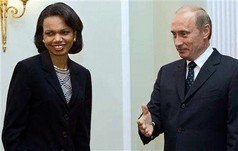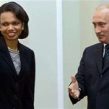
DIPLOMATIC FRENZY AS NEW COLD WAR LOOMS
Publication: Eurasia Daily Monitor Volume: 4 Issue: 96
By:

This week U.S. Secretary of State Condoleezza Rice, en route to Moscow, told journalists that Russo-American relations are “not easy,” but that the tensions do not amount to a new Cold War (AP, RIA-Novosti, May 14).
During the Cold War era there were times of acute tension between East and West, and times of mutual détente, when relations were seemingly better than today. Rice’s rejection of a “new Cold War” is mostly semantic in nature and a good starting point for future academic discussions: Was the original Cold War a unique event in human history or could it be replayed in other circumstances? Currently, there is an acute crisis in relations between Russia and the Euro-Atlantic community. This crisis is rapidly spreading, encompassing additional issues, while attempts to defuse the tension do not work.
Rice came to Russia to discuss proposed U.S. missile defense deployments in Europe, independence for Kosovo, Moscow’s decision to halt compliance with provisions of the 1990 Conventional Forces in Europe (CFE) treaty, Iran’s nuclear program, and the clampdown on democracy in Russia. As Rice was in Moscow, German Foreign Minister Frank-Walter Steinmeier also arrived on an unscheduled visit. Germany currently holds the rotating presidency of the EU and is trying to salvage the Russo-EU summit planned for Friday, May 18, near Samara on the Volga River (RIA-Novosti, May 15).
In addition to missile defense, CFE, democracy in Russia, and Kosovo independence, Steinmeier intends to discuss specific Russo-EU conflicts: Russia’s two-year ban on meat and plant imports from Poland; Lithuania’s complaint that Russia has cut off supplies to its oil refinery; Russia’s plans to drastically cut timber exports that have upset Finland, and the conflict with Estonia over the relocation of a Soviet-era World War II monument from central Tallinn. On Tuesday, May 15 Moscow announced that it plans to build a nuclear reactor and research center in Burma — a state run by a ruthless military dictatorship that is an international outcast (Itar-Tass, May 15). This latest move may also strain relations.
At previous summits, the EU and Russia have regularly issued joint declarations to underline areas of agreement. Today negotiations on a new Russo-EU strategic partnership agreement are frozen and the EU Commission is talking of postponing Russia’s long-sought WTO membership. Germany — Russia’s closest ally in Europe for many years — is scrambling to prevent the Samara summit from degenerating into an open public fray.
Russia’s present confrontation with the West, unlike the Cold War standoff, covers not only military and political issues, but also economic and financial ones. During the Cold War Russo-U.S. summits were grand events that centered on nuclear arms control and often effectively defused East-West tensions on many issues. Nowadays summits are not that effective. Attempts to solve problems the old way — by trying to revitalize Russo-U.S. nuclear arms control — do not help to clear other obstacles.
The joint visits to Moscow by Rice and Steinmeier did not and could not do much. At least everyone, including the Russians, put on a brave face and pretended that it is still business as usual and that the problems between Russia and the West are not as bad as they are.
Separately the United States and the EU cannot bridge the present East-West rift. The EU cannot do much about planed U.S. missile defense deployments in Europe. Nor is Washington too concerned about Russian plans to scrap CFE, since the Pentagon has installed a superb intelligence-gathering network that gives it more information about the Russian military than the CFE confidence-building regime of notification and onsite inspection. Of course, the Pentagon does not share much of its intelligence with European allies. European states have been shocked by the apparent sudden end of CFE, while Washington is much more concerned about Iraq, Iran, and the situation in, say, Georgia.
Last week in Brussels Russia’s chief of the General Staff, General Yuri Baluyevsky, told NATO generals the Russian Defense and Foreign Ministry lawyers are working on ways to implement President Vladimir Putin’s declaration of a “moratorium” on CFE observance (RIA-Novosti, May 10). In fact Russian diplomats say openly that Putin’s CFE “moratorium” is a legal impossibility and only a formal abrogation is possible (see EDM, May 2). At present officials do not know what to do next and are waiting for additional guidance from the Kremlin.
For the Kremlin the CFE and most other multiple issues that today wreck relations with the West are not, in fact, decisive. Russia is today reasserting itself and wants a new grand pact with the West, something like the Yalta accord of 1945, that would clearly delineate Russia’s new sphere of imperial influence in Europe and Asia, with the West assuring noninterference within that zone. Today even if the West would want to make such a deal, there is no legal framework within which to negotiate.
It seems the most important event of Rice’s visit was her official working dinner with First Deputy Prime Minister Sergei Ivanov (RIA-Novosti, May 14). Legally, Ivanov’s current assignment does not cover foreign or security policy — that is the Kremlin’s sole purview. But Rice’s talks with Ivanov before she met with Putin are solid evidence that today Ivanov is in fact an unofficial vice president. This seems to be an open declaration by the Kremlin that Ivanov is Putin’s chosen successor, someone who is already taking over responsibility for the Russo-U.S. dialogue on defense and security.




